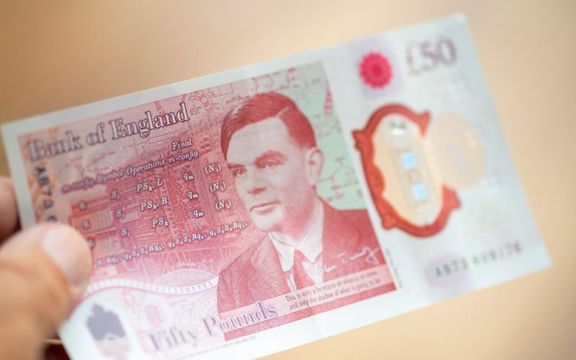
Alan Turing on the UK £50 noteGetty
British mathematician, logician, cryptanalyst, and computer scientist Alan Turing was born in June 1912 and is most famous for inventing the Enigma machine which helped crack German code during World War II.
Did you know that the Apple logo is said to have been inspired by Alan Turing? Steve Jobs was believed to be so in awe of Turing - without a doubt the brightest mind of his generation - that the Apple logo was created in honor of his life. However, Turning’s life, while full of contributions that changed the face of mankind, is ultimately defined by his death. Turing took his own life, aged 41, in June 1954, by eating an apple laced with cyanide after undergoing chemical castration as a way to avoid jail time, to which he was sentenced after being found guilty of homosexual acts. Turing received a royal pardon posthumously in 2013 and is finally starting to receive the accolades he so rightfully deserves and is considered the father of computer mathematics and artificial intelligence.
Born in June 1912 in London - Turing displayed signs of high intelligence at a young age and eventually went on to study at King’s College Cambridge. Following his graduation in 1934, Turing spent two years working on his seminal paper - On Computable Numbers, with an Application to the Entscheidungsproblem - in which he presented for the first time the Turning machine, which was capable of computing anything is computable and is considered the precursor to the modern computer. After receiving his Ph.D. from Princeton University in 1938 he returned to Cambridge and started his career with the Government Code and Cypher School, a British code-breaking organization.
During World War II, Turing spent time working with codebreakers at Bletchley Park heading up the team at Hut 8 which was focused on breaking the code used by Enigma, a type of enciphering machine used by the German armed forces to communicate securely during the war. During his time at Bletchley, Turing worked with fellow codebreaker Gordan Welchman to create a machine known as the Bombe - which significantly helped to make life easier for the codebreakers. Following from the success of the Bombe, Turing and the team turned their attention to German naval fleets which were, at that point of the war, heavily impacting the Allied progress. Building on the captured Enigma material, Turing developed a technique called Banburismus which enabled the team to read the naval message from the German u-boats, hugely impacting the war efforts and saving countless Allied lives.
Following the war, Turing returned to his work on the Universal Turing Machine whilst working for the National Physical Laboratory. The Universal Turing Machine became the Automatic Computing Machine - the predecessor to the modern computer.
Turing was given an OBE in 1945 for his services during the war and in 1949 he was given a position at the University of Manchester as the Deputy Director of the Computing Company. He turned his attention to the issue of artificial intelligence and in his paper, Computing Machinery and Intelligence, he outlined a method to determine if a machine is intelligent or not. He referred to it as the “imitation game”, but it is better known as the “Turing test”. The Turing Test is considered to be one of the greatest advances in our modern day understanding of artificial intelligence and its uses in the world.
In 1952 Turing was arrested for homosexuality and found guilty of ‘gross indecency’. Rather than face jail time, Turing accepted chemical castration which saw him receive a number of hormone injections which rendered him impotent. As a result of the castration, Turing lived his remaining years with a testosterone imbalance and his 1954 death was ruled to have been by suicide.
Turing’s work was originally honored with the introduction of The Turing Award in 1966, however, the full extent of his work at Bletchley Park was not revealed until the late 1990s. Following his posthumous pardon in 2013, Turning was subsequently honored by being the face of the British fifty pound note, ensuring his life was not forgotten.





Comments